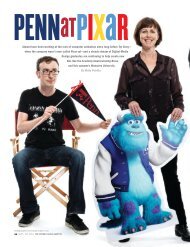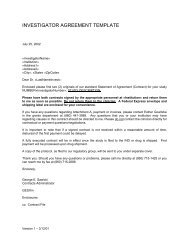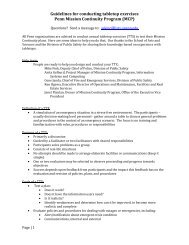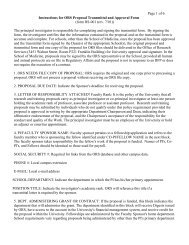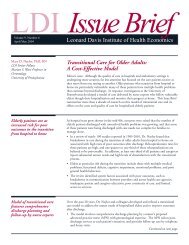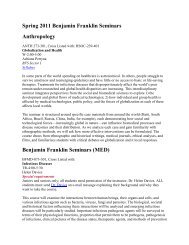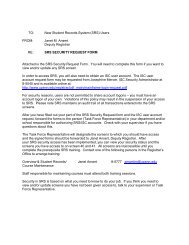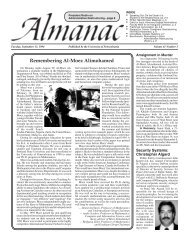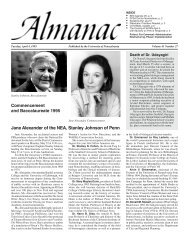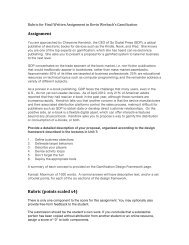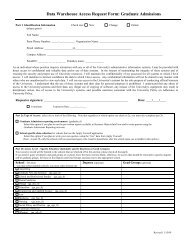PENNPRINTOUT - University of Pennsylvania
PENNPRINTOUT - University of Pennsylvania
PENNPRINTOUT - University of Pennsylvania
Create successful ePaper yourself
Turn your PDF publications into a flip-book with our unique Google optimized e-Paper software.
Virtual <strong>University</strong> (from page 1)<br />
character or consequences.<br />
We are setting <strong>of</strong>f into a terra incognita. What is an<br />
academic course? Who are our students? Who is teaching?<br />
When has a student satisfied the requirements for a<br />
degree? How do we create and manage information?<br />
So, here is my first guess at the future.<br />
Fears for the institution<br />
The electronic environment threatens to blow away<br />
our traditional definitions <strong>of</strong> the course. The new media <strong>of</strong><br />
teaching and learning are so much more flexible than the<br />
traditional lectures or discussion classes, reading lists,<br />
papers, and exams that it is hard to imagine that the notion<br />
<strong>of</strong> the course will not soon be challenged. Today, a course<br />
is measured against a reasonably well-understood standard—so<br />
many credit units for so many class hours, so<br />
many exams and papers, so much reading. But when the<br />
majority <strong>of</strong> communication between faculty and students<br />
and among students occurs outside class hours, when<br />
students write hundreds <strong>of</strong> lines <strong>of</strong> prose or calculations in<br />
e-mail discussions <strong>of</strong> topics, when research is conducted in<br />
electronic databases, when a paper might be built up by a<br />
group <strong>of</strong> students writing and editing and adding text and<br />
footnotes until it is abandoned to the faculty member, how<br />
will we calculate the course then?<br />
We are on the verge <strong>of</strong> a revolution in the way we<br />
define the building blocks <strong>of</strong> a university education and we<br />
do not yet have any idea <strong>of</strong> how or whether we will be able<br />
to integrate the new with the old.<br />
Who will be in our “classrooms”? Already the few<br />
courses that have used the Internet to expand the interaction<br />
<strong>of</strong> students and faculty and to make the syllabus and<br />
texts <strong>of</strong> the course available electronically have seen the<br />
boundary between student and participant break down.<br />
Only registered students are getting academic credit for a<br />
course with Internet participants, but many others can join<br />
in the class discussions and might even send in unsolicited<br />
work. I’ve seen cases <strong>of</strong> students who were rejected from a<br />
program sneaking into the program by taking courses<br />
through the Internet. Faculty rarely turn away someone<br />
who wants to learn from them. The electronic environment<br />
provides a new avenue for unauthorized participation in a<br />
program, and by the time a department has caught on the<br />
student can claim to have satisfied many <strong>of</strong> the requirements<br />
for its program.<br />
But even without imagining the most extreme case, we<br />
can see that the distinction between students and nonstudents<br />
will fade in our new ecosystem and that the<br />
question <strong>of</strong> who benefits and has a right to benefit from our<br />
teaching will become increasingly complicated. This is not<br />
all bad, <strong>of</strong> course. Think <strong>of</strong> the way alumni will be able to<br />
continue their learning and participation in the intellectual<br />
life <strong>of</strong> the university. I see a future in which alumni will<br />
stay in touch with faculty as well as with the athletic<br />
teams. But will the faculty be able to cope? Will we have<br />
to evolve a tough hide to repel the importunate learner,<br />
even the brilliant one? What will that do to our sense <strong>of</strong><br />
our selves as teachers or to our self-interest as learners, as<br />
we are, to a large extent, in our advanced classes?<br />
Once the campus space gains an electronic dimension,<br />
the question <strong>of</strong> who teaches our students will become an<br />
issue. Penn has an agreement with Princeton that permits<br />
graduate students <strong>of</strong> each institution to take a certain<br />
number <strong>of</strong> courses at the other campus. Once the Internet<br />
becomes an effective medium <strong>of</strong> teaching, what will stop<br />
Academia<br />
seems to be<br />
the only place<br />
where all politics<br />
are not local<br />
us from making myriad agreements <strong>of</strong> this sort? What will<br />
stop students from surfing the Internet to find that perfect<br />
course in Fulgentius or Martianus Capellanus? What then<br />
will it mean to say that students who come to Penn will<br />
study with a topflight faculty recruited and promoted by<br />
the <strong>University</strong>?<br />
And what will happen to the academic republic? The<br />
faculty define the academic program for their students.<br />
When the faculty are not defined by the university’s body<br />
corporate, the locus <strong>of</strong> academic authority will inevitably<br />
change. All those who teach “our” students will be able to<br />
claim a role in deciding what constitutes a good curriculum.<br />
Students will call on their whole faculty, defined by<br />
the Internet rather than by the campus <strong>of</strong>fice buildings and<br />
laboratories, to define what they should study.<br />
We faculty tend toward authoritarianism in curricular<br />
matters, but we will not be able to stand long against the<br />
tide <strong>of</strong> student demand for something more than we<br />
alone—the faculty <strong>of</strong> a particular university—can give.<br />
The students who will define excellence will be those who<br />
have mastered a few languages and can join classes across<br />
linguistic and cultural borders as well as across city and<br />
state boundaries.<br />
I predict that the challenges <strong>of</strong> the new academic<br />
ecosystem will engender a period <strong>of</strong> authoritarianism and<br />
xenophobia. Today, faculty in (continued on next page)<br />
APRIL 1995 21



